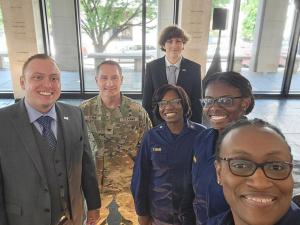Power through partnership: an ROA exclusive interview
On Aug. 1, ROA interviewed National Guard Bureau and U.S. Public Health Service representatives to discuss their joint efforts in securing medical readiness.
WASHINGTON, D.C., UNITED STATES OF AMERICA, August 22, 2024 /EINPresswire.com/ -- The uniformed services of the United States are facing unprecedented challenges.
But as history has shown, national unity in the face of adversity is essential to accomplish a mission.
One example of the military embodying this spirit is the partnership between the National Guard Bureau and U.S. Public Health Service Commissioned Corps.
On Aug. 1, ROA held an exclusive interview1 with National Guard and USPHS representatives to spotlight the growing relationship between these two organizations.
“When we work together, it’s not just one and one equals two, its one and one equals three,” said Army Col. Tom Leeper, chief, medical operations, National Guard Bureau Joint Surgeon's Office. “It’s great because there’s a lot of common ground there. Even though we have different functions, we don’t really have a duplication of service. We really complement each other, and we have a synergistic effect.”
The National Guard and USPHS Commissioned Corps play critical roles in ensuring the health, wellbeing, and medical readiness of the Total Force and the nation.
In the beginning of the COVID-19 pandemic, the National Guard lacked the manpower and capability needed to execute its missions, according to Colonel Leeper.
Similarly, the USPHS Commissioned Corps lacked the recognition and state-level contacts to deploy efficiently outside the federal space, according to the services’ first ever full-time legislative liaison, Lt. Cmdr. Zakiya Chambers.
The National Guard’s state level contacts and the USPHS Commissioned Corps' medical specialization complemented each other well. By training and deploying together through official memorandums, both services overcame these challenges and created conditions for a partnership that is more than the sum of its parts.
USPHS Cmdr. Ingrid St. Amand, a former Maryland National Guardsman, addressed this in detail:
“The Army has the principle, fight like you train and train like you fight. So that’s what this partnership sets out to do: to make sure that we’re preparing for the deployments prior to, understanding each other’s capabilities, and understanding each other’s languages as well,” said Commander St. Amand. “It’s a perfect fit when you have two organizations that have aligned missions. Like Colonel Leeper mentioned, we help to fill each other’s gaps where needed.”
In addition to increasing readiness in the COVID-19 pandemic, through the Remote Area Medical and Innovative Readiness Training programs, the National Guard and USPHS have honed their skills and provided no cost healthcare to in-need communities.
They have also successfully jointly deployed on multiple occasions in response to natural disasters, a growing mission set for the National Guard in particular.
While the National Guard and USPHS Commissioned Corps have managed to overcome systemic cultural and legal challenges through building their partnership, budgetary ones remain.
“As the only uniformed service without an operations and maintenance budget, the USPHS Commissioned Corps has been hampered” said Lieutenant Commander Chambers. “But we’ve been very creative in working with the National Guard Bureau, and other partners, to mitigate issues and turn challenges into opportunities.”
ROA is fighting on Capitol Hill to provide the National Guard and USPHS Commissioned Corps with the tools needed to grow their partnership and sustain the Total Force’s medical readiness. This includes restoring rescinded funding for the USPHS Ready Reserve Corps, advancing legislation that provides benefits parity between the uniformed services, and delivering no-cost medical and dental care to all members of the Selected Reserve.
While the need for ROA’s advocacy remains, this partnership has proven its capability and potential in the face of adversity.
ROA envisions this partnership serving as a model to better prepare the nation for future public health emergencies and support the military in large scale combat operations.
Aug. 1 was also the official retirement date of the twenty-ninth Chief, National Guard Bureau, Gen. Daniel Hokanson.
ROA’s legislation and military policy director Matthew Schwartzman started the interview with a tribute to the general and his distinguished military career.
“On behalf of ROA, thank you General Hokanson for your more than 30 years of service in the National Guard,” said Schwartzman. “You have been a steadfast champion for the cause of National Guard readiness, and the care and wellbeing of those that serve and their families. ROA wishes you the best of luck in this next chapter.”
Representing the National Guard Bureau was Army National Guard Col. Tom Leeper.
Representing the U.S. Public Health Service Commissioned Corps was Cmdr. Ingrid St. Amand and Lt. Cmdr. Zakiya Chambers.
The USPHS Commissioned Corps leadership thanks ROA for their time and attention in highlighting this important partnership.
Matthew Schwartzman
Reserve Organization of America
mschwartzman@roa.org
Visit us on social media:
Facebook
X
LinkedIn
Instagram
YouTube
WATCH NOW: Power through partnership: an ROA exclusive interview at http://www.youtube.com/watch?v=qLQ6zG22jJQ

1 https://youtu.be/qLQ6zG22jJQ?si=33xRSyJTKyyfazaM


